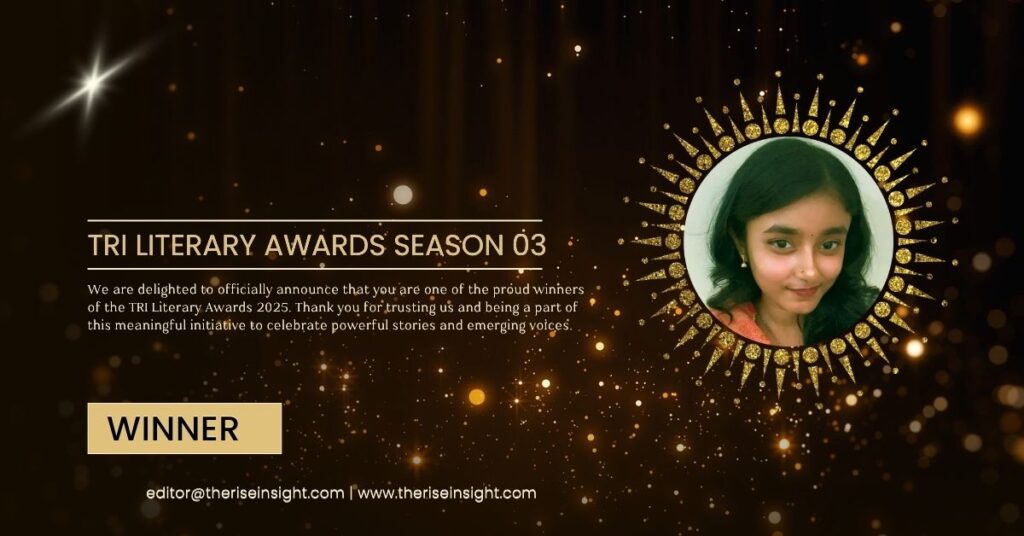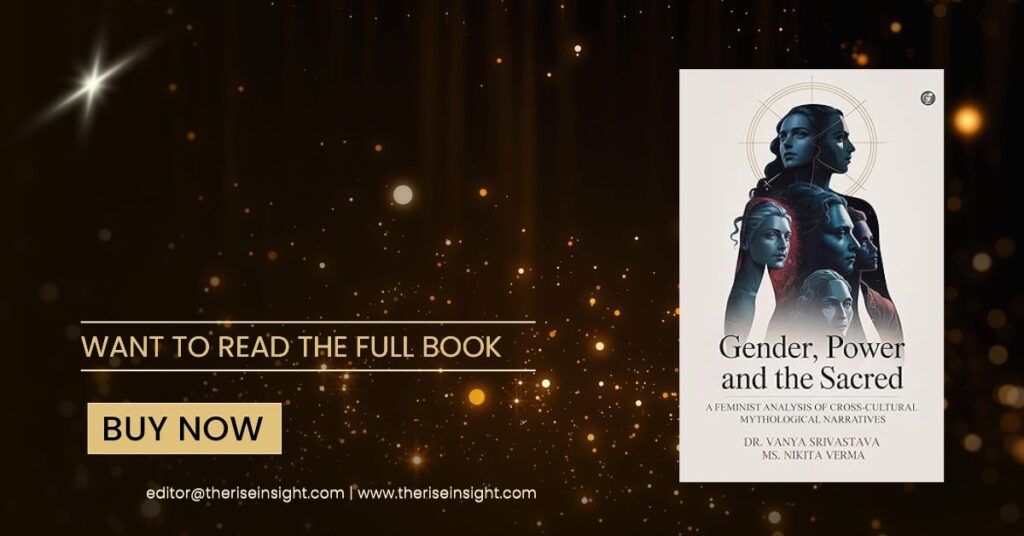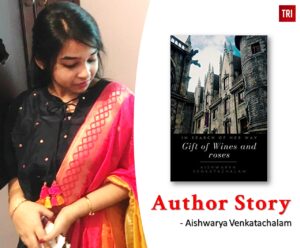
Your bold and insightful work, “Gender, Power and the Sacred: A Feminist Analysis of Cross-Cultural Mythological Narratives”, is a landmark contribution to contemporary feminist scholarship and literary discourse. As a reviewer, it was not only a pleasure but an intellectual and emotional journey to read this powerful exploration of mythology through a deeply feminist lens. This book is a triumph—not just in its academic merit, but in its cultural relevance and passionate voice.
A Review of “Gender, Power and the Sacred” by Nikita Verma
In a world where patriarchal structures continue to echo across societal, religious, and artistic frameworks, Nikita Verma’s “Gender, Power and the Sacred” arrives as a vital, courageous, and compelling narrative that reclaims and reinterprets ancient myths through the eyes of feminist critique. At just 21, Verma has produced a work that carries the weight and depth of a seasoned scholar, blending rigorous academic inquiry with an unmistakable personal urgency. This book is not merely a thesis or research—it is a literary act of resistance and reclamation, a rewriting of voices lost in silence and shadows.
From the very first page, Verma makes it clear that mythology is not to be dismissed as mere fiction or fable. Rather, she positions these narratives as cultural artifacts, as ideological vessels that reflect the gendered dynamics of their time—dynamics that still influence our worldview today. This is a foundational premise of the book, and one that Verma tackles with both precision and poetic insight.
Interdisciplinary Excellence
One of the most striking strengths of this work is its interdisciplinary approach. Verma seamlessly weaves together feminist theory, classical studies, psychoanalysis, visual culture, and gender studies—resulting in a complex, layered examination that is both accessible and profound. Drawing inspiration from thinkers such as Simone de Beauvoir, bell hooks, Judith Butler, Laura Mulvey, and Sandra Gilbert, Verma doesn’t simply regurgitate their ideas; she builds on them with fresh perspective, connecting ancient mythology to contemporary feminist dialogue.
The comparative lens is especially effective. Whether she’s discussing the divine pairs of Greek mythology—Aphrodite and Ares, Hera and Zeus—or moving across to Roman and Indian traditions with Venus-Mars and Shiva-Parvati, Verma paints a vivid picture of how goddesses and female figures are simultaneously venerated and subjugated. Her use of cross-cultural analysis strengthens her core argument: that gendered power structures are not isolated to one geography or tradition, but are systemic, deeply embedded, and universally recurrent.

Deconstructing the Divine Feminine
One of the most poignant threads in the book is Verma’s exploration of the double standards imposed upon mythological women. Goddesses are often portrayed as symbols of purity, fertility, love, or destruction—but always in relation to male counterparts. Aphrodite, for instance, is at once a figure of divine beauty and a subject of moral suspicion. Hera, though a queen of the gods, is reduced to the trope of the jealous wife. Parvati’s strength and divinity are tethered to her role as Shiva’s consort, often overshadowing her independent identity as Shakti.
What Verma does so brilliantly is hold these paradoxes up to the light. Through detailed analysis, she shows how these contradictions are not accidental but intentional, reflective of societal discomfort with female autonomy and agency. She uncovers how mythological storytelling has historically mirrored real-world patriarchal anxieties—sanctioning control under the guise of sanctity.
In doing so, she doesn’t vilify the myths, but rather, she challenges their interpretation and offers space for reclamation. Her work does not call for the erasure of these narratives but for their re-reading through feminist consciousness.
Male Divinity and Idealization
Contrasting the portrayal of female deities, Verma turns her attention to male figures in mythology—often idealized as warriors, gods, kings, or saviors. These characters are frequently presented with agency, autonomy, and heroic destiny. Ares and Mars, for instance, embody war and masculinity. Zeus, despite his moral ambiguities, retains his position as king of the gods. These roles reinforce traditional male dominance and establish templates for masculinity that are normalized across ages.
Verma’s critique is sharp but balanced. She highlights how male divinity, though glorified, also suffers from the burden of emotional repression, stoicism, and violence. Her analysis invites readers to question not only how femininity is framed in mythology, but also how masculinity has been confined to rigid ideals.
The Personal is Political
What elevates this book from being merely an academic contribution is the personal resonance that pulses through its pages. Verma doesn’t shy away from letting her voice come through—and it is a powerful one. As a young feminist scholar, her perspective is refreshingly fearless, and her honesty is disarming. She writes not from a detached academic distance, but from a place of deep emotional and intellectual investment.
This is particularly evident in the concluding sections of the book, where Verma reflects on how mythology can be reimagined today. Through the eyes of modern feminist scholars, artists, and reinterpretations in literature and cinema, these age-old tales are given new life and new purpose. Mythology, as she rightly argues, is not static—it is dynamic, evolving, and capable of transformation depending on who tells the story.
Stylistic Brilliance and Scholarly Integrity
Verma’s prose is a balance of eloquence and clarity. She avoids the heavy jargon that often weighs down academic writing and instead opts for a lucid style that invites a wider readership. Every chapter is meticulously structured, backed by credible sources, and enriched by thoughtful interpretation. Her references to visual culture—art, sculpture, film—add another layer to her arguments, demonstrating how these myths continue to influence popular imagination today.
Yet, for all its scholarly integrity, the book also resonates on a human level. It touches on grief, power, desire, control, love, and liberation—all through the lens of divine narratives that still shape collective consciousness.
A Timely and Timeless Contribution
In an age where feminist discourse continues to evolve and where young voices are leading vital conversations, Gender, Power and the Sacred stands out as a beacon. It reminds us that stories are powerful, that the past is not dead, and that the myths we inherit can either bind or free us—depending on how we choose to read them.
Nikita Verma has not only written a book—she has carved a space for herself in the literary and academic world as a thinker, a challenger, and a storyteller. Her courage to interrogate tradition, to dissect power, and to do so with such maturity and insight at this early stage in her career is deeply admirable.
Here’s feedback in paragraph form from each of the nine reviewers after reading “Gender, Power and the Sacred: A Feminist Analysis of Cross-Cultural Mythological Narratives” by Nikita Verma:
1. Prashant Sahu:
Nikita Verma’s book is a thought-provoking masterpiece that redefines how we perceive mythological narratives. Her detailed analysis and comparisons between different cultural traditions shine a bold light on the gender politics buried deep within sacred texts. It’s intellectually rich and emotionally impactful—a rare blend of scholarly depth and human sensitivity.
2. Sameer Gudhate:
As someone who appreciates both mythology and gender studies, I was blown away by the clarity and conviction with which Nikita presents her arguments. She challenges established norms without ever losing respect for tradition. Her work bridges the ancient and the modern, showing how reinterpretation can empower contemporary gender discourse.
3. Apeksha Gupta:
This book is not just an academic study—it’s a personal revolution. I felt moved by the way Nikita explored the inner conflicts of mythological women, caught between divinity and societal expectation. Her writing is eloquent, passionate, and most importantly, necessary for readers navigating the intersections of feminism and faith.
4. Akansha Sinha:
Nikita’s voice resonates with power and clarity. Her interdisciplinary method and ability to unpack the symbolism in myths made me re-examine stories I thought I already understood. She reclaims space for women in history and mythology, and as a reader, I felt both enlightened and empowered by her vision.
5. Glenville Asbhy:
The scope of this book is ambitious, and yet Nikita manages to deliver with poise and precision. Her engagement with psychoanalysis, feminist theory, and literature is seamless. It’s a compelling reminder that mythology is a cultural script we inherit—but also one we can revise through conscious reflection and dialogue.
6. Pooja Sahu:
What I loved most about this book is how Nikita gives voice to mythological women who have often been silenced or stereotyped. Her analysis of Shiva-Parvati and Aphrodite-Ares made me pause and reconsider how gender roles are glorified or diminished. It’s a brave and beautifully articulated study.
7. Versha Singh:
Reading this book was like peeling back layers of cultural conditioning. Nikita doesn’t just decode myths; she reimagines them. Her insights into the sacred feminine, the objectification of goddesses, and the imbalance of power in divine pairs were truly eye-opening. It’s a work that demands reflection.
8. Shivangi Yadav:
Nikita’s work is sharp, fierce, and unapologetically feminist. I admired how she navigated multiple traditions with respect while holding them accountable through a critical lens. This book will surely become a staple in feminist literary circles. It educates, challenges, and inspires all at once.
9. Kavita Kaushik:
I found Gender, Power and the Sacred to be one of the most intelligent and emotionally resonant reads in recent times. Nikita doesn’t just write with academic insight—she writes with heart. Her book is a call to re-examine the past so we can rewrite the future of gender narratives with balance and truth.
Final Thoughts
This book deserves a place on the shelf of every feminist reader, scholar, mythologist, and anyone who believes in the transformative power of stories. It is rare to come across a work that is so intellectually enriching and emotionally stirring at the same time.
To Nikita Verma: congratulations again on your well-deserved win at the TRI Literary Awards 2025 Season 3. Gender, Power and the Sacred is not just a book—it’s a legacy in the making. And we can’t wait to see what powerful stories you tell next.






